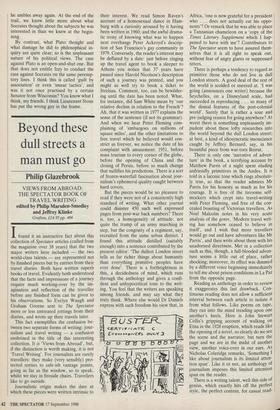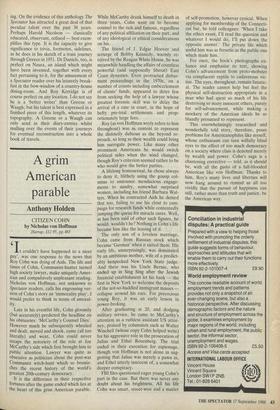Beyond these dull streets a man must go
Philip Glazebrook
VIEWS FROM ABROAD: THE SPECTATOR BOOK OF TRAVEL WRITING edited by Philip Marsden-Smedley and Jeffrey Klinke
Grafton, L14.95 pp. 466
Ifound it an instructive fact about this collection of Spectator articles (culled from the magazine over 38 years) that the two major writers here included — the two world-class talents — are represented not by finished pieces but by entries from their travel diaries. Both have written superb books of travel. Evidently both understood that the facts and impressions of a journey require much working-over by the im- agination and reflection of the traveller before any finished form can be given to his observations. So Evelyn Waugh and Graham Greene sent to The Spectator more or less untreated jottings from their diaries, and wrote up their travels later.
This fact exemplifies the confusion be- tween two separate forms of writing: jour- nalism and travel writing — a confusion enshrined in the title of this interesting collection. It is 'Views from Abroad', but, if the distinction is worth making, it is not 'Travel Writing'. For journalists are rarely travellers: they make (very sensibly) pro- tected sorties to safe-ish vantage points, going as far as the window, so to speak, whilst we stay in fireside chairs. Travellers like to go outside.
Journalistic origin makes the date at which these pieces were written intrinsic to their interest. We read Simon Raven's account of a homosexual dance in Ham- burg with a curiosity aroused by it having been written in 1960; and the awful drama- tic irony of knowing what was to happen next overhangs Peter Ackroyd's descrip- tion of San Francisco's gay community in 1979. Conversely, the reader's interest may be deflated by a date: just before ringing up the travel agent to book a sleeper to Athens you notice that 37 years have passed since Harold Nicolson's description of such a journey was printed, and you might as well try to book a ticket to Strelsau. Comment, too, can be bewilder- ing until the date has been noted. What, for instance, did Sam White mean by 'our relative decline in relation to the French'? Ah, that it was written in 1977 explains the sense of the sentence (if not its grammar). And when we hear Peter Fleming com- plaining of 'embargoes on millions of square miles', and the other limitations to free travel which he believed would con- strict us forever, we notice the date of his complaint with amusement: 1951, before mass tourism to every corner of the globe, before the opening of China and the closing of Persia, before so much change that nullifies his predictions. There is a sort of frozen-waterfall fascination about jour- nalism's ephemeral quality caught between hard covers.
But the pieces would be no pleasure to read if they were not of a consistently high standard of writing. What other journal could disinter 450 such well expressed pages from post-war back numbers? There is, too, a homogeneity of attitude: not quite the tramp of an army marching in step, but the congruity of a regiment, say, recruited from the same urban district. I found this attitude distilled (suitably enough) into a sentence contributed by the present editor: 'The dullest London street tells us far richer things about humanity than everything primitive peoples have ever done'. There is a forthrightness in this, a decidedness of mind, which runs through the anthology and gives a confi- dent and unhypocritical tone to the writ- ing. You feel that the writers are speaking among friends, and may say what they truly think. Where else would Dr Daniels express with such freedom his view that, in
Africa, 'one is now grateful for a president who . . . does not actually eat his oppo- nents'? Or remark that he was able to place a Tanzanian chameleon on a 'copy of the Times Literary Supplement which I hap- pened to have with me'? Contributors to The Spectator seem to have assured them- selves that it is all right to speak out, without fear of angry glares or suppressed titters.
There is perhaps a tendency to regard as primitive those who do not live in dull London streets. A good deal of the rest of the world is scolded or sneered at. 'I was going (announces one writer) because the Seychelles, on a Disneyland scale, had succeeded in reproducing . . . so many of the dismal features of the post-colonial world'. Surely that is rather a sour and pre-judging reason for going anywhere? At worst there is something unpleasantly im- pudent about these lofty researches into the world beyond the dull London street; at best, a kind of idiosyncratic insouciance caught by Jeffrey Bernard, say, in his beautiful piece from war-torn Beirut.
There is only one 'narrative of adven- ture' in the book, a terrifying account by Matthew Parris of a night spent eluding unfriendly primitives in the Andes. It is told in a laconic tone which rings absolute- ly true, so that the reader admires Mr Parris for his honesty as much as for his courage. It is free of the tiresome self- mockery which crept into travel-writing with Peter Fleming, and free of the con- cealed boasting of Victorian travellers. As Noel Malcolm notes in his very acute analysis of the genre, 'Modern travel writ- ing has somehow ceased to believe in itself', and I wish that more travellers would go out and have adventures like Mr Parris', and then write about them with his unadorned directness. Met in a collection such as this, though, a full-blooded adven- ture seems a little out of place, rather shocking; moreover, its effect was dimmed by a different voice beginning immediately to tell me about prison conditions in La Paz from the opposite page.
Reading an anthology in order to review it exaggerates this last drawback. Con- tinuous reading does not allow a sufficient interval between each article to isolate it from what follows. Like poems on tape, they run into the mind treading upon one another's heels. Here is John Stewart Collis's gripping account of walking on Etna in the 1928 eruption, which reads like the opening of a novel, so clearly do we see the scene and the narrator; but turn the page and we are in the midst of another view, another voice-over in our ears. As Nicholas Coleridge remarks, 'Something I like about journalism is its limited atten- tion span'. Like it or not, an anthology of journalism imposes this limited attention span on the reader. There is a writing talent, well this side of genius, which exactly hits off the perfect style, the perfect content, for casual read-
ing. On the evidence of this anthology The Spectator has attracted a great deal of that peculiar talent over the past 38 years. Perhaps Harold Nicolson — classically educated, observant, refined — best exem- plifies this type. It is the capacity to give significance to trivia, footnotes, sidelines, as he does in his sketch of a train journey through Greece in 1951. Dr Daniels, too, is perfect on Naura, an island which might have been invented, together with every fact pertaining to it, for the amusement of a Spectator reader over his leisurely break- fast in the bow-window of a country-house dining-room. And Roy Kerridge is of course perfect on any location. I do not say he is a 'better writer' than Greene or Waugh; but his talent is best expressed in a finished piece of this length, whatever its topography. A Greene or a Waugh can only send in their diary-entries whilst mulling over the events of their journeys for eventual reconstruction into a whole book of travels.



































































 Previous page
Previous page